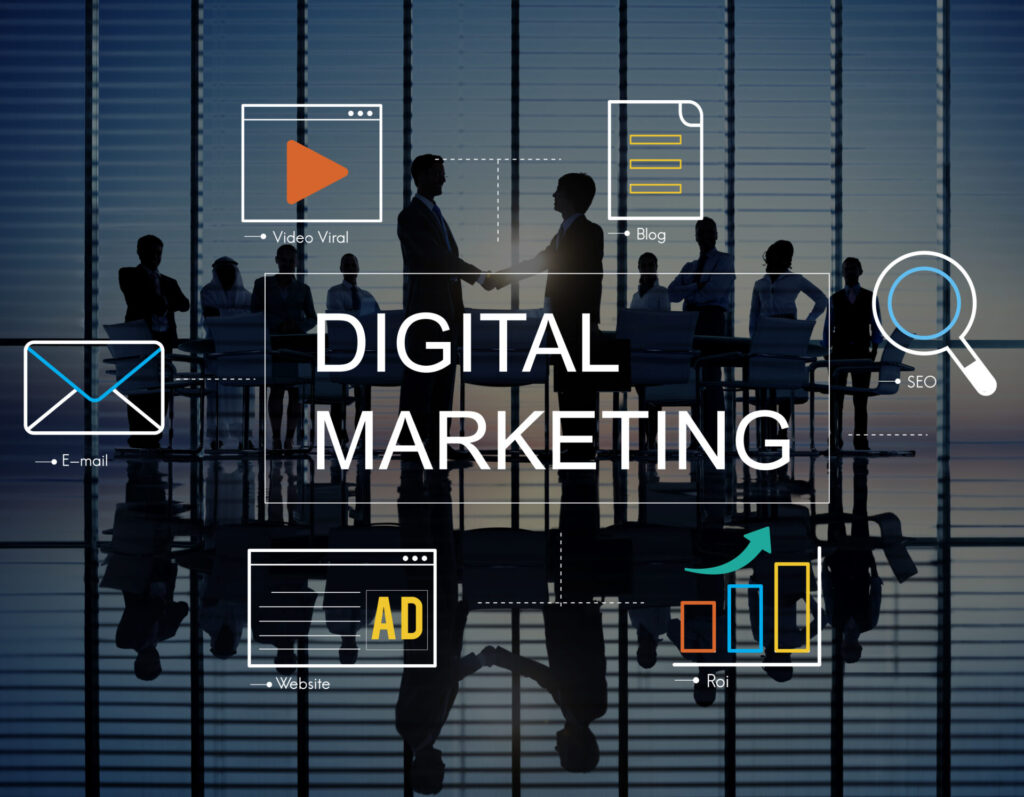In today's digital age, where the online marketplace is saturated with numerous businesses competing for…

PPC Advertising: The Basics of Pay-Per-Click
PPC Advertising is important in online marketing. They bring specific people to websites. This guide explains PPC, how it works, why it’s important in online marketing, how to manage it, and why it’s better than traditional ads.
It’s good for digital marketers, business owners, or anyone who wants to use PPC for online success.
What is Pay-Per-Click (PPC)?
PPC is when advertisers pay for each click on their online ads. It’s a way to get website visits by paying, not by natural ways. Google Ads and Bing Ads are popular for PPC. Advertisers compete for ad spots in search results for keywords related to their business.
Bidding on terms like “PPC software” can get our ad at the top of Google search.
But PPC isn’t just about search engines. It also includes display advertising and remarketing. These are ads that appear on websites and social media platforms.
Here are some key elements of a PPC campaign:
- Keyword Research: Finding and selecting the right keywords for your campaign.
- Ad Copy: Writing compelling advertisements that will attract clicks.
- Landing Pages: Designing web pages that will convert visitors into customers or leads.
- Quality Score: Google’s rating of the quality and relevance of your keywords, landing pages, and PPC campaigns.
Understanding PPC is crucial for any online marketing strategy. When done right, this can give fast results and a big return on money.
PPC in Digital Marketing World
 PPC is important in digital marketing. It helps drive specific visitors to websites quickly. SEM includes both paid and organic strategies. SEO gets traffic naturally, while it buys visits to your site.
PPC is important in digital marketing. It helps drive specific visitors to websites quickly. SEM includes both paid and organic strategies. SEO gets traffic naturally, while it buys visits to your site.
It is fast and can show results right away. It’s great for new websites or product launches. You can target specific users with PPC based on keywords, location, and more. This helps make your ads more effective.
In summary, PPC is crucial in digital marketing. It helps with other strategies to make online marketing successful.
How Does Pay-Per-Click Work?
Pay-Per-Click, or PPC, is when advertisers pay when someone clicks on their ad. Instead of waiting for people to find their website on their own, advertisers pay for visitors.
Advertisers start by picking keywords they think their customers will use. Then, they make ads based on these keywords. These ads show up on search engines when people type in those keywords.
The ads’ placement on the search engine results page is decided by an auction. This auction is done automatically by search engines like Google to make sure the ads are relevant and trustworthy.
The Bidding Process
In PPC advertising, bidding on keywords is very important. Advertisers place bids to show their ads when these keywords are searched. The higher the bid, the better the ad placement.
It’s not only about the bid amount. Search engines also look at other factors like ad relevance and quality, as well as the landing page.
The bidding process is finding the right balance between how much you want to pay for an ad and how good the ad is. This way, even smaller businesses with lower budgets can still compete with bigger companies.
Quality Score and Ad Placement
Google Ads uses Quality Score to measure how good your ads are. This score estimates how well your ads, keywords, and landing pages work. Better quality ads can save you money and give you better ad spots.
Quality Score is based on a few things. This includes how well your keyword matches your ad group, how effective your landing page is, and how many clicks your ad gets.
Having a high Quality Score can make a big difference in your PPC results. It can help you get better ad placements and pay less, making your PPC campaign more effective and affordable.
Key Platforms for PPC Advertising
PPC advertising uses different platforms like Google Ads, Bing Ads, and social media sites. Google Ads is the biggest platform because Google is the most popular search engine. It lets advertisers make text, image, and video ads.
 Other platforms like Bing Ads, Facebook, Instagram, and LinkedIn also have unique features for targeting specific audiences. The platform you choose depends on your business goals and who you want to reach.
Other platforms like Bing Ads, Facebook, Instagram, and LinkedIn also have unique features for targeting specific audiences. The platform you choose depends on your business goals and who you want to reach.
Google Ads
Google Ads is the most widely used PPC advertising platform. It operates on a pay-per-click model, where users bid on keywords and pay for each click on their advertisements.
When you search on Google, it picks advertisers who bid the most for certain keywords. These advertisers appear on the search results page. Google also looks at the quality of their ads and how relevant they are to the search.
Other PPC Platforms
While Google Ads is the most popular, other platforms offer PPC advertising options. Bing Ads, for example, provides a similar service as Google Ads but with less competition.
Social media platforms like Facebook and LinkedIn offer PPC advertising options too. These platforms know a lot about their users, so they can show ads to specific groups of people.
For instance, Facebook Ads can target users based on their interests, behavior, and demographic details.
In conclusion, the best PPC platform for you depends on where your audience is and what you’re selling. To make a good choice, you need to know what each platform does well and what it doesn’t do well.
Crafting Effective PPC Campaigns
To make a PPC campaign work, you need to plan carefully, execute strategically, and keep making it better.
Start by deciding what you want to achieve with your campaign. Do you want more people visiting your website, getting leads, or making more sales? Your goals will shape your plan and show if it’s working.
Then, figure out who you’re trying to reach with your ads. What do they like? What do they need? This will help you make ads that connect with them and get them to do what you want.
Here are the key components of a successful PPC campaign:
- Keyword research
- Writing compelling ad copy
- Designing landing pages for conversion
Keyword Research
Keyword research is important for PPC campaigns. It means finding the words your customers use to search for your products.
Picking the right keywords is crucial. Choose words that are related to your business, popular, and not too competitive.
Writing Compelling Ad Copy
The next step is to write compelling ad copy. Your ad copy should be clear, concise, and engaging. It should highlight the unique benefits of your product or service and include a strong call to action.
Remember, your ad copy is the first interaction potential customers have with your brand. Make it count.
Designing Landing Pages for Conversion
You must make landing pages that can get people to act. A good landing page looks nice, is simple to use, and matches your ad.
Your website needs to explain what you do and tell visitors what to do next, like buy something, sign up for emails, or get a guide.
PPC Management and Optimization
After you start your PPC campaign, you need to keep checking on it. You have to make sure it’s working well.
 PPC management includes checking your campaign, changing bids, testing new ideas, and making improvements to get better results.
PPC management includes checking your campaign, changing bids, testing new ideas, and making improvements to get better results.
Here are some important parts of PPC management:
- Monitoring and adjusting bids
- A/B testing and analytics
Monitoring and Adjusting Bids
Checking your bids regularly is important for managing PPC advertising. You need to watch how your campaign is doing and make changes to your bids as needed.
If a keyword is doing well, you should think about raising your bid. This can help your ad show up more often. But if a keyword isn’t doing well, you might want to lower your bid or stop using it.
A/B Testing and Analytics
A/B testing and analytics are important for making your PPC campaigns better. A/B testing means trying out different ads or landing pages to see what works best.
Analytics gives you information about how well your campaign is doing. It shows you what is working and what needs to be changed.
The Benefits of Paid Search Advertising
Paid search ads, like PPC, help businesses meet their marketing goals. One good thing is being able to reach certain groups of people.
 With PPC, you can choose who sees your ads based on keywords, location, demographics, and time of day. This helps you reach the right people at the right time, increasing the chances of getting sales.
With PPC, you can choose who sees your ads based on keywords, location, demographics, and time of day. This helps you reach the right people at the right time, increasing the chances of getting sales.
Another benefit is speed. Unlike organic search, PPC gives immediate results. Your ads can start bringing in traffic as soon as they’re live.
Paid search ads also give measurable results. With the right tools, you can track clicks, impressions, conversions, and ROI. This data helps you make smart decisions about your marketing.
Common PPC Terms and Definitions
In PPC, there are some words and meanings you should know. These words help you run and make your PPC ads better.
Here are some of the most common PPC terms:
- Keyword: A word or phrase that advertisers bid on. When users search for that keyword, the advertiser’s ad may appear in the search results.
- Click-Through Rate (CTR): The percentage of people who click on your ad after seeing it. To find the click-through rate, divide the number of clicks by the number of times the ad was shown.
- Cost-Per-Click (CPC): The amount you pay each time someone clicks on your ad.
- Quality Score: Google Ads uses a metric to check if your ad is relevant and good quality.
- It affects your ad rank and CPC.
- Conversion Rate: The percentage of users who complete a desired action (like making a purchase) after clicking on your ad.
Knowing these words will help you understand PPC and use it effectively for your ads. Remember, knowledge is power in the world of digital marketing.
Getting Started with Your First PPC Campaign
Starting your first PPC campaign can seem daunting. But with the right approach, it can be a smooth process. Here are some steps to guide you:
- Define your goals: What do you want to achieve with your PPC campaign? More website traffic? Increased sales? Brand awareness?
- Identify your target audience: Who are you trying to reach with your ads? What are their interests and behaviors?
- Choose the right platform: Google Ads is the most popular PPC platform, but there are others like Bing Ads and Facebook Ads.
- Create your ads: Write compelling ad copy and design attractive visuals to catch your audience’s attention.
Setting a Budget
Setting a budget for your PPC campaign is important. It shows how much you want to spend on your ads. Begin with a budget you feel good about. You can change it later based on how well your campaign is doing.
In PPC advertising, you only pay when someone clicks on your ad. Your budget is used to pay for these clicks. Make sure your budget matches your marketing goals and business objectives.
Selecting Keywords and Match Types
Picking the right keywords is crucial for your PPC campaign to do well. Keywords are the words or phrases people type into search engines. Your ads show up in search results when these keywords are used.
In PPC advertising, there are different ways keywords can match. These are exact match, phrase match, and broad match. Each type has its own pros and cons. It’s important to know about these types and pick the one that fits your campaign goals the best.
Conclusion and Next Steps in PPC
In short, Pay-Per-Click ads are great for online marketing. It helps businesses reach their customers without spending too much money. But, like any marketing plan, it needs careful planning and management for success.
As you continue with PPC, keep learning and adjusting. PPC changes often, so stay current with new ideas. Try out new approaches and don’t be afraid to be creative. Your PPC journey is just starting.



